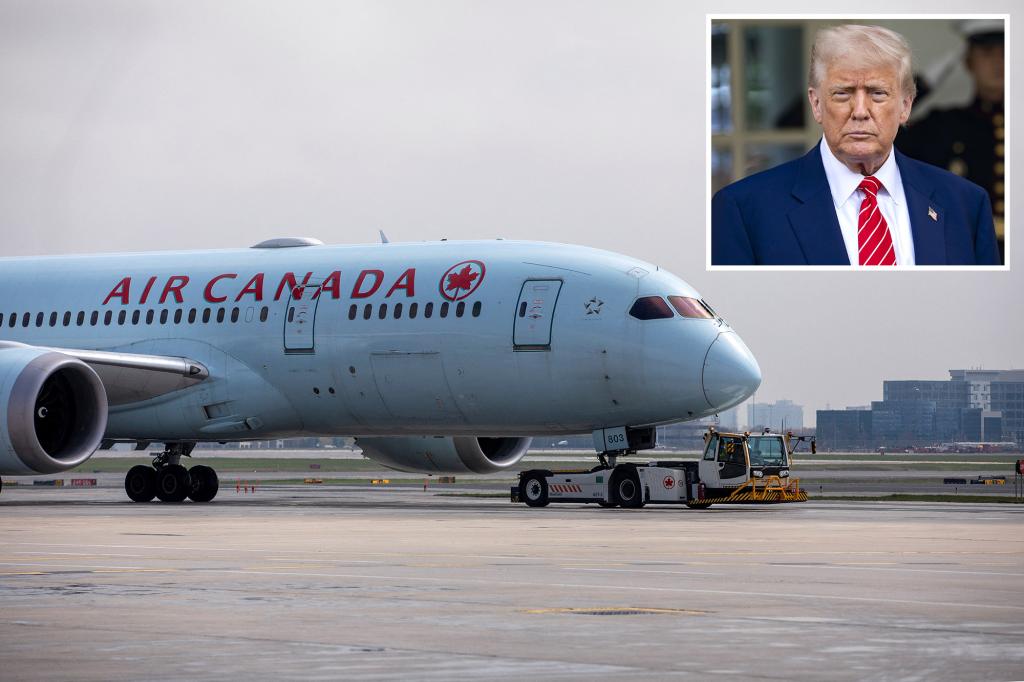Air Canada slashed its 2025 profit forecast after a sharp drop in bookings for US-bound flights amid heightened tensions over President Trump’s policies and rhetoric — and New York City is already feeling the sting from the apparent travel boycott.
The Montreal-based airline on Friday said it is seeing a “low teens” percentage decline in bookings over the next six months for trips across the US.
That follows a 4.6% drop in passenger revenue on Canada-US routes during the first quarter, with traffic falling 7%, the company said in earnings report.
Canadians have been rejecting U.S.-made goods and canceling trips south of the border over Trump’s tariffs on the northern neighbor and his suggestion that Canada should become the 51st state.
During a meeting with newly elected Canadian Prime Minister Mark Carney on Tuesday, Trump reiterated his desire to annex Canada.
“Never say never,” Trump said, after the liberal PM said that Canada would never be for sale.
The fallout from strained US-Canada relations is rippling through New York City’s tourism industry.
The number of visitors from Canada — typically one of the city’s most reliable sources of international tourists — has dropped sharply, dragging down overall projections for 2025.
The city had entered the year expecting a full recovery to pre-pandemic travel levels, but now anticipates only 64.1 million visitors, down from an earlier estimate of 67.6 million, according to NYC Tourism.
The revised forecast includes an increase of 400,000 domestic travelers, but a loss of 800,000 international tourists.
More than half that drop is attributed to Canadian travelers. In March, Air Canada reported a 10% decline in year-over-year bookings for flights to the US between April and September.
New York relies heavily on international tourists to sustain its hospitality and cultural sectors.
Overseas travelers tend to stay longer and spend more than domestic ones.
Last year, tourists spent $51 billion in the city — half of that attributed to foreign visitors.
This year, that figure is expected to drop by $4 billion.
Some major attractions have also reported fewer customers.
The Empire State Building Observatory experienced a nearly 5% decline in attendance during the first quarter, and sightseeing bus operators have seen foreign ridership fall by as much as 25%.
Some tour operators have shifted focus to lower-cost services as international travelers become more budget-conscious.
Others have postponed hiring and investment plans amid economic uncertainty and softening demand from critical markets like Canada.
Airports in the region have seen a decrease of roughly 117,000 foreign arrivals so far this year compared to the same period in 2024, according to the Port Authority.
Air Canada raised its fares to help soften the blow from plunging bookings, but the decline led the carrier to revise its earnings forecast downward by $144 million.
The airline now expects full-year earnings before interest, taxes, depreciation and amortization to range between $2.3 billion and $2.6 billion.
Previously, it had forecast a range topping out at $2.75 billion.
“Uncertainty was for sure the main theme during the first quarter,” CEO Mike Rousseau told analysts.
“We are experiencing booking declines on the trans-border market in the low teens on average over the next six months.”
First-quarter losses were narrower than analysts had expected, but ongoing uncertainty surrounding US tariffs, retaliatory Canadian trade measures and a weaker Canadian dollar continue to weigh on the airline’s transborder operations, Rousseau added.
Shares in Canada’s biggest airline jumped more than 10% in morning trade after it reported the smaller than expected quarterly loss.
Although overall demand for air travel remains relatively steady, analysts have flagged weakening fundamentals and expressed concern about future volatility.
Total revenue in the first quarter reached $3.9 billion, just shy of Wall Street expectations. The company’s stock is down more than 30% since the start of the year.
